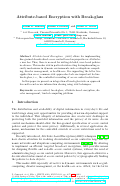Attribute-based Encryption with Break-glass
by Achim D. Brucker, Helmut Petritsch, and Stefan G. Weber
 Attribute-based Encryption (ABE) allows for implementing fine-grained decentralized access control based on properties or attributes a user has. Thus, there is no need for writing detailed, user-based policies in advance. This makes ABE in particular interesting for implementing se- curity mechanisms in dynamic environments such as ubiquitous comput- ing, disaster management, or health-care. For supporting the latter two application areas, common ABE approaches lack one important feature: break-glass, i. e., the controlled overruling of access control restrictions. In this paper we present an integration of break-glass into an approach for end-to-end secure information sharing using ABE techniques.
Attribute-based Encryption (ABE) allows for implementing fine-grained decentralized access control based on properties or attributes a user has. Thus, there is no need for writing detailed, user-based policies in advance. This makes ABE in particular interesting for implementing se- curity mechanisms in dynamic environments such as ubiquitous comput- ing, disaster management, or health-care. For supporting the latter two application areas, common ABE approaches lack one important feature: break-glass, i. e., the controlled overruling of access control restrictions. In this paper we present an integration of break-glass into an approach for end-to-end secure information sharing using ABE techniques.
Keywords: access control, break-glass, attribute-based encryption, disaster management, trusted computing plattform
Categories:
Documents: (full text as PDF file)
 Please cite this article as follows:
Please cite this article as follows:
Achim D. Brucker, Helmut Petritsch, and Stefan G. Weber.
Attribute-based Encryption with Break-glass.
In Workshop In Information Security Theory And Practice (WISTP). Lecture Notes in Computer Science (6033), pages 237-244, Springer-Verlag, 2010.
Keywords: access control, break-glass, attribute-based encryption, disaster management, trusted computing plattform
(full text as PDF file) (BibTeX) (Endnote) (RIS) (Word) (doi:10.1007/978-3-642-12368-9_18) (

| abstract | = | {Attribute-based Encryption (ABE) allows for implementing fine-grained decentralized access control based on properties or attributes a user has. Thus, there is no need for writing detailed, user-based policies in advance. This makes ABE in particular interesting for implementing se- curity mechanisms in dynamic environments such as ubiquitous comput- ing, disaster management, or health-care. For supporting the latter two application areas, common ABE approaches lack one important feature: break-glass, i. e., the controlled overruling of access control restrictions. In this paper we present an integration of break-glass into an approach for end-to-end secure information sharing using ABE techniques.}, | |
| address | = | {Heidelberg}, | |
| author | = | {Achim D. Brucker and Helmut Petritsch and Stefan G. Weber}, | |
| booktitle | = | {Workshop In Information Security Theory And Practice (WISTP)}, | |
| doi | = | {10.1007/978-3-642-12368-9_18}, | |
| editor | = | {Pierangela Samarati and Michael Tunstall and Joachim Posegga}, | |
| fullbooktitle | = | {Information Security Theory and Practice. Security and Privacy of Pervasive Systems and Smart Devices}, | |
| keywords | = | {access control, break-glass, attribute-based encryption, disaster management, trusted computing plattform}, | |
| language | = | {USenglish}, | |
| number | = | {6033}, | |
| pages | = | {237--244}, | |
| = | {https://www.brucker.ch/bibliography/download/2010/brucker.ea-attribute-based-2010.pdf}, | ||
| publisher | = | {Springer-Verlag}, | |
| series | = | {Lecture Notes in Computer Science}, | |
| title | = | {Attribute-based Encryption with Break-glass}, | |
| url | = | {https://www.brucker.ch/bibliography/abstract/brucker.ea-attribute-based-2010}, | |
| year | = | {2010}, |

